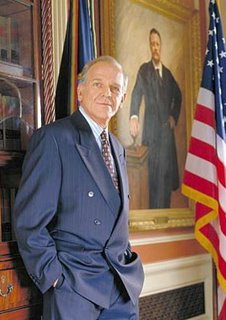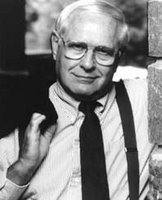 [[O B I T]] * I was saddened to hear that John Spencer, the craggy but endearing character actor who played presidential chief of staff turned vice-presidential candidate Leo McGarry on NBC-TV’s The West Wing, died in Los Angeles on Friday as a result of a heart attack. He was only 58 years old and perished just four days shy of what would have been his 59th birthday on Tuesday.
[[O B I T]] * I was saddened to hear that John Spencer, the craggy but endearing character actor who played presidential chief of staff turned vice-presidential candidate Leo McGarry on NBC-TV’s The West Wing, died in Los Angeles on Friday as a result of a heart attack. He was only 58 years old and perished just four days shy of what would have been his 59th birthday on Tuesday.Richard Schiff, who plays Toby Ziegler, the heart-on-his-sleeve former White House communications director on the series, described Spencer as “one of those rare combinations of divinely gifted and incredibly generous.” Schiff added: “There are very few personal treasures that you put in your knapsack to carry with you for the rest of your life, and he’s one of those.” Aaron Sorkin, who created The West Wing, called Spencer “an uncommonly good man, an exceptional role model, and a brilliant actor.”
Born to working-class parents near Paterson, New Jersey, in 1946, Spencer enrolled in acting classes as a teenager with Liza Minelli, and began his small-screen career by playing the recurring role of Henry Anderson, the boyfriend of British cousin Cathy on the old Patty Duke Show. He went on to take parts in the TV soap Another World and the Al Pacino film Sea of Love (1989), before landing the role of Detective Lipranzer, Harrison Ford’s former partner in the 1990 legal thriller Presumed Innocent. From there, he leapfrogged to portraying Tommy Mullaney, a rumpled and distinctively streetwise attorney on the TV series L.A. Law, following that with roles in a Perry Mason TV movie, the films The Rock (1996) and Twilight (1998), and the short-lived but interesting TV series Trinity. It wasn’t until 1999 that he stepped into what seemed to audiences to be a perfect-fitting role for him as McGarry, a Chicago-reared Vietnam War vet, recovering alcoholic (like Spencer himself) and valium addict, and former U.S. secretary of labor. As West Wing’s backstory revealed, it was the always-in-control McGarry who’d convinced his old friend and then-Governor Josiah “Jed” Bartlet (Martin Sheen) of New Hampshire to compete for the Democratic nomination as president of the United States, and subsequently managed Bartlet’s successful campaign.
Spencer won an Emmy Award in 2002 for his work on The West Wing, and was nominated four other times for his participation in that smart and brilliantly conceived drama. He seemed quite comfortable in the shoes of an old government hand like McGarry. When asked once by a reporter from PBS-TV’s NewsHour with Jim Lehrer whether the hard-edged McGarry was cynical about the purpose and power of government, Spencer replied:
I don’t think so. I think he’s a realist, but I don’t think he's cynical. I don’t think a man of his age could be cynical and choose this life. All parts of Leo’s life are put on hold, except his service to the government and to the president--and to his friend, who happens to be the president. So I don’t think if he were too cynical he would choose that route at this point. I think he’d go into retirement or lecturing, or something like that.In retrospect, it seems a startling parallel with reality that one of last season’s episodes of The West Wing found McGarry being struck down by a heart attack, shortly after he was dismissed as chief of staff for refusing to support President Bartlet’s optimistic plans for a Middle East peace negotiation. However, McGarry survived, and this year--in what’s been shaping up to be one of this Emmy-winning series’ most dynamic seasons--he was tapped by three-term Texas congressman and Democratic presidential nominee Matthew Santos (Jimmy Smits) to be his running mate. And Wing’s most recent, December 11th episode found officials from the Democratic National Committee trying to convince the much more experienced McGarry to take the Santos campaign’s reins from Bartlet’s former deputy chief of staff, Josh Lyman (Bradley Whitford)--something McGarry was reluctant to do.
Not to take away at all from the sorrow one should feel for the passing of an actor so skilled and watchable as Spencer was, but there’s also the interesting question raised now of how The West Wing’s writers will handle the death of a character so pivotal and popular as Leo McGarry. Given production times, it’s likely that whatever episodes will be broadcast in January and February have already been shot, with Spencer playing McGarry, as usual. Whether those episodes cover the anticipated election of Santos hasn’t yet been reported. If they don’t, then future scripts will have to incorporate the unexpected demise of a vice-presidential nominee (a much trickier matter, it would seem, even than candidate George McGovern’s real-life decision to replace U.S. Senator Thomas Eagleton on the 1972 Democratic ticket, after it was revealed that Eagleton had undergone electroshock treatment for depression); if they do, then the writers will need to build in a state funeral for a newly elected vice president.
The latter case might provide the most novel and dramatic solution. After all, in American history, only seven vice presidents have died while still in office, the first of those being George Clinton (who served under James Madison, but died in 1812) and the most recent being James S. Sherman (who was William Howard Taft’s veep, before succumbing in 1912). Leo McGarry’s perishing on The West Wing, shortly after he wins the presidential election at Santos’ side, would shake things up in fascinating ways, gaining the new president some national sympathy he could leverage to his advantage during his initial months in the Oval Office.
Just a thought ...
 DEATH OF A MUCKRAKER: Gone now, too, is Jack Anderson, a onetime war correspondent and Pulitzer Prize-winning investigative journalist who gained fame for unearthing government corruption, uncovering a CIA scheme to assassinate Cuban President Fidel Castro, and revealing ties between the Mafia and FBI Director J. Edgar Hoover (who, according to The New York Times, once derided Anderson for being “lower than the regurgitated filth of vultures”). He was 83 years old and died on Saturday from Parkinson’s disease. Read more about Anderson here, here, and here. And investigative reporter Murray Waas, who has written elsewhere that he “worked for Jack when I was still just a kid, when I was 18 and 19 years old,” pens an especially fine encomium to Anderson in The Village Voice. Don’t miss it.
DEATH OF A MUCKRAKER: Gone now, too, is Jack Anderson, a onetime war correspondent and Pulitzer Prize-winning investigative journalist who gained fame for unearthing government corruption, uncovering a CIA scheme to assassinate Cuban President Fidel Castro, and revealing ties between the Mafia and FBI Director J. Edgar Hoover (who, according to The New York Times, once derided Anderson for being “lower than the regurgitated filth of vultures”). He was 83 years old and died on Saturday from Parkinson’s disease. Read more about Anderson here, here, and here. And investigative reporter Murray Waas, who has written elsewhere that he “worked for Jack when I was still just a kid, when I was 18 and 19 years old,” pens an especially fine encomium to Anderson in The Village Voice. Don’t miss it.







No comments:
Post a Comment